229 free CV templates in Microsoft Word | Page 4
Jump to: Page 1 | Page 2 | Page 3 | Page 4 | Page 5 | Page 6 | Page 7 | CV guide | CV content
If you find a template that you like, we'd appreciate a review or a 'Facebook Like' and we'd absolutely love it if you shared this page!
Latest CV templates:
Sales Manager CV/Résumé template (free download)
An attractive General or Regional Sales Manager CV/Résumé template with purple & grey accents and a stylish box layout for your achievements. The example content shows you how to write key parts such as the summary and responsibilities.
Personal Assistant CV template in MS Word – free to download
A stylish Personal Assistant CV template with example information. Attractive headings and bulleted lists in a simple ATS-friendly layout.
General Manager CV template (triple bar design)
Our ‘Triple Bar’ CV template features a subtle but stylish 3 bar design to the left of each section, with large grey headings separating the sections up.
Team Leader CV template (with sample content)
An attractive résumé or CV template with sample information for a Team Leader or Supervisor role. Using a traditional Times New Roman font, with a soft green border and large headings. A simple, traditional CV layout suitable for most jobs.
School leaver CV template (2021)
We show you how to write a UK school leaver’s CV with a complete ‘how-to-write’ guide and real examples. We also give you a smart modern school leaver template that you can download and use yourself.
Nursing CV template
A two-column CV template with deep red accents, in Microsoft Word format. Sample information is included for a Registered Nurse. This Nursing CV will provide valuable inspiration for any candidate looking to write their CV for a similar role.
Quantity Surveyor CV example (template + sample info)
A solid example of a CV for a Quantity Surveyor position in the UK. A simple layout holds the key sections for your CV: personal profile, key skills, work history and education, plus space for professional memberships.
Customer Service Advisor CV example (template + sample info)
A smart Customer Service Advisor CV template, with sample information including a profile, work history, key skills and education section.
Assistant Manager CV template (with sample content)
This effective Assistant Manager CV sample shows exactly how you can craft your own CV to impress prospective employers.
Account Assistant CV example
A concise Account Assistant CV example in a basic CV template, with a strong introductory section, work history including example achievements, education and key skills.
Food Services Manager CV template (Simple, ATS-friendly)
A basic, effective CV template with sample information for a Food and Beverage Manager Role. Simple, ATS-friendly layout.
Legal Receptionist CV example
This neat Legal Receptionist CV example has red accents, a boxy border & use of classic Times New Roman for a smart professional finish.
Legal Assistant CV template – ATS-friendly
A smart, ATS-friendly Legal Assistant CV template with eye-catching headers. Sample information for a legal role and ‘How to write’ guide.
Blue layout general CV template in Word format – 2020 update
#206: A brand new look for our old blue CV design, with better spacing & a focus on achievements. A General CV template with sample information for a Marketing Manager.
Basic CV template UK layout (free, MS Word)
Our basic CV template has always been a great choice for a clean simple job application with no fuss or clutter. It’s a simple layout that prompts you to complete the core sections, so you don’t miss important details out.
Receptionist CV template with example content (updated 2020)
This smart grey and black receptionist CV template in MS Word features a soft thick grey border around the edge of the page and eye catching headings in smart Arial which are split into grey and black.
Secretary CV Sample : Word CV template (free download)
A clean, fresh template using the Garamond font, with sample information for a secretary. This smart design keeps the focus on your info while adding some very subtle style elements.
Conveyancing CV example : free Word CV template to download
A professional legal-themed conveyancing CV template for a property lawyer that splits into 2 columns after the intro. A unique squares design creates eye-catching headings & helps to divide up your information.
Sales assistant CV template (UK) : soft blue design in Microsoft Word
This neatly presented sales assistant CV is designed for a UK sales / retail type role. Two lovely fonts and some splashes of blue make this ATS-friendly template a great choice of layout for almost any position.
Graduate CV example : Microsoft Word template (free download)
Clean, fresh and attractive, this ATS-friendly graduate CV template is very subtle in design but doesn’t want for anything more. Bold headers, a neat border and a splash of blue helps your application stand out.
Free Office Admin CV template in Microsoft Word format
A fresh 2-page easy-to-edit admin CV built using tables. Using two free fonts and splashes of colour and an easy-to-read format, it’s a crisp, stylish look that will make a great first impression.
Colourful CV template (free) : 2019 update
#198: A lovely updated version of our ‘Colour Blocks’ CV, with more space, different alignment & the font-spacing feature. Sample information for an Administrator.
Legal CV with Sections – free Word CV template (work experience focused)
With a bold main heading, stand-out sub headings, dividing lines and orange accents, this eye-catching legal CV template works for a wide range of roles. One page format with two columns and plenty of space.
Student CV template : featured boxes design (free download)
This is a great student CV template to catch an employer’s eye with some smart yet subtle design features, including dropped capitals, blue headers and featured boxes that ensure your achievements stand out.
Light blue creative CV template
A smart but not overly graphical free CV template in Word, in a light blue colour theme – free to download and customise. Optional space for a photo and attractive icons used for contact info in the footer.
Free Example CV template in Microsoft Word
This example CV template is the perfect inspiration for creating your own effective CV. It has lots of nice details including dropped capitals, featured boxes and neat headings. Sample information for a student job-seeker.
Helvetica free Word CV template
This Word CV template uses Helvetica font which has been shown to be one of the most effective fonts to use on a CV. Boxes neatly divide up the sections and the blue accents look attractive while drawing the eye.
The 10 soft skills to make you employable
Whether you’re looking for your first job or taking a step up the career ladder, demonstrating the right soft skills on your CV will help you stand out from the competition. On the flip side, it doesn’t matter how many qualifications and hard skills you have if you lack in some of the core soft skills every employer expects.
Q: What is a soft skill?
We’ve all come across someone at work that is clearly very qualified for the role but often struggles to do a good job. The reason for this is that they have a low ability in a particular soft skill, which hinders their progress and prevents them from using their knowledge in the correct way.
A soft skill is a personal trait that enables you to function well whilst in the workplace. The skills and qualifications you’ve achieved need to be used in conjunction with your personal attributes. Unlike a hard or specific skill that could relate to using computer software, a soft skill relates to a more generic skill, like communication.
Of course, it's no good simply claiming to have these skills without any evidence. You need to show the employer you have acquired and used them through examples in your work history, education/training and hobbies/interests.
So to create new career opportunities and give yourself the best possible chance of an interview, here are the 10 soft skills you need to demonstrate on your CV to make you more employable:
"Using action verbs such as achieved, established, exceeded, supervised and surpassed, will help guide you towards showing an employer what you can do rather than simply telling them."
1. Communication
Communicating effectively in the workplace can take many different forms. It could be an internal email or even directly with a customer; a newsletter or article, or a video presentation you’ve created. No matter what style of communication applies to your chosen career, you obviously need to hold this soft skill to a high level.
If you fail to communicate your ideas and thoughts to a customer or co-worker in an efficient, professional and friendly manner, you will cause all sorts of problems for yourself and the company. Consider how you communicate to those around you and what affect that has on them. Do they feel positive afterwards or is your negative style creating issues? What’s the message you’re trying to convey? Are you easy to understand or often leave people confused?
How to show communication on your CV:
A good communicator can demonstrate this skill on their CV with examples of effective listening, negotiation, training and mentoring, lecturing / presenting, and written communication such as company newsletters or blog articles. Where possible, give an example of using the skill and any positive results that ensued. For example:
- Written communication: "I prepared the monthly internal and external company newsletters, and regularly blogged for the Company website. My articles received a total of 30,000 views in the past year and directly resulted in 250 new enquiries." (point to specific examples of impressive work if available)
- Listening: "I held focus groups, interviewing customers on their use of Product X. I compiled the results into User Stories which were prioritised and utilised to improve the software. Following these changes, the company saw a 15% increase in new subscriptions and a 55% decrease in lost subscriptions."
- Training: "I trained and mentored 3 juniors who had no prior experience for my team during my two years in this position. Collectively our team was the highest revenue achiever for 19 out of the 24 months."
- Presenting: "I regularly visited customers, typically presenting the product to board rooms of 10+. I closed 73% of my deals, compared to a team average of 50%."
2. Teamwork
There are very few jobs that require little or no interaction with a team member. So even if you’re a solo worker you still need to know how to work well in a team. The secret is to focus upon how the team can achieve its goal, and not how you can do it on your own. This approach is the first step to becoming a valuable team member.
This particular soft skill relies on other soft skills – communication, problem solving, time management, leadership, and so on. Working with others can often result in arguments and certain individuals putting their own interests above those of the teams. Your ability to integrate into a team and focus upon the end result will matter to the company, and your future. This is especially important if you are hoping to become a manager or supervisor.
How to show teamwork on your CV:
Give examples of where you have worked in a team, and where that has been successful. Give real results where possible. For example:
- "I worked in a team of 5 where each of us had a different role in the process. Without failed the team produced all work on time and to the clients' satifaction during my 18 months at the company."
- "My team worked on Software X for 2 years, taking it from conception to production. In its first year of trading, it beat the market leader in sales numbers and generated £1.2m turnover for the company."
- "My team had responsibility for organising the X exhibition for 3 years from 2016 - 2019. The event was fully subscribed in 2016 and over subscribed in 2018 / 19, with 50% of the exhibitors taking us up on the offer of booking 2 years ahead."
3. Leadership
If you are looking to climb the career ladder from worker to supervisor, you need to consider this particular soft skill. Being able to lead a team to success will again require lots of other skills to fall into place. You cannot assume that being a leader is just about being great at your current job and telling everyone how to do theirs. There is so much more to it!
Consider the other 9 soft skills and how you can achieve them all. You cannot lead a team successfully if you struggle at just one of the other skills. Everything needs to be developed over time, and your choices should reflect your passion for the team and company’s success – not just your own.
How to show leadership on your CV:
Don't just give examples of when you've led a team - mention the team's successes too, so that employers can see that your leadership was effective. Leadership success could be measured in many ways, such as increases in leads and sales, completion of a project on time and to budget, or even employee satisfaction / a reduction in staff turnover.
4. Lack of vanity
This soft skill covers the ability to spot your own mistakes and learn from them. You need to put ego to one side and acknowledge you’re not perfect. If you don’t, you will struggle to learn anything new and those around you will often become frustrated.
Take a step back now and again whilst at work and consider your own thoughts and actions. Don’t shift the blame to others when the mistake lies at your feet. Even if others did contribute to a mistake you should always take responsibility and accept what’s happened. Could you have done better? How can you do better next time?
How to show a lack of vanity on your CV:
Vanity is an excessive pride in or admiration of one's own appearance or achievements. It is a lack of humility and failure to acknowledge others' contributons. You can keep your CV vanity free by being honest and open about the part you played, by showing proper gratitude to those who helped you, and by showing that when things go wrong, you can let go. If someone made a lousy decision that set you back, don't give any hint that you're still dwelling on it or seek to apportion blame. Take the approach of, 'this happened, it was unfortunate - but I dealt with it like this', rather than 'X was to blame, and I still can't get over it.' In the words of Mahatma Gandhi, "The weak can never forgive. Forgiveness is the attribute of the strong."
5. Intrinsic motivation
You shouldn’t have to rely on the company to motivate you to come to work. It’s great when they give out bonuses, pay rises and extra holidays, but is that really enough to achieve job satisfaction?
Your own self motivation is what the employer is looking for. Job satisfaction is not just about how much you get paid, but how much you enjoy the work you do. Coming to work everyday with low levels of motivation makes for an unproductive employee. It can also create mistakes and affect the rest of the team. Even if your results are slightly above average, your mood can have a negative impact on how others perform.
Are you highly motivated at work? If not, why not? Try to be the most positive in your team and infect those around you with your fantastic mood. Your motivation is the key to yours and the company’s success. Make yourself more employable by projecting that self-motivation on others and keep your levels of productivity high. If you still struggle to be motivated then you should consider if you’re in the right career. Try to hone in on what’s causing you issues and look for a fix.
How to show intrinsic motivation on your CV
To show that you're intrinsically motivated, you need to demonstrate a passion for the role and the industry. For example:
- Blog regularly about industry topics - include your website address on your CV.
- Follow influencers, share industry-relevant material and get involved in the discussion on Twitter and LinkedIn. Include your Twitter/LinkedIn addresses on your CV.
- Build a killer LinkedIn profile to complement your CV and use it to showcase your work.
- Join a professional organisation that helps further areas of your industry, or join an industry reference group and contribute to consultations.
6. Decision making
The decisions you make are very important to the company. Everyone will be given a certain level of responsibility and be allowed to make important decisions on a daily basis. Making the right ones is what this soft skill is all about.
The employer will place their faith in you and watch closely how you perform. Becoming more employable is about making decisions that are based on a few things:
- How it will affect the customer
- How it will affect the team
- How it will affect the company
One thing you will see missing from the above is – how it will affect you. This is because your decisions need to encompass everyone including yourself, and not just your own solo efforts.
When applying for a job you should include lots of examples on your CV of how your decision making turned into positive results. The employer wants to know that they can trust you to get the job done, and that you don’t have to be micro managed.
How to show decision making on your CV:
When it comes to showing decision making on your CV, you need to take cues from the job advert. Is the employer looking for someone who can make fast decisions under pressure, or ethical decisions? Do they want you to show initiative or are they looking for someone who can make tough decisions when the need arises? Try to give examples that match the type of decisions you'll be making. For example, if it's decisions under pressure, you could write on your CV:
- "Responsibility for making a large number of fast decisions on a daily basis. As a result, slashed cost per lead by 45% over 12 months."
- "Received commendation 4 times during appraisals from Senior Management Team for good decision making under pressure."
- "Was given GDPR as a project on short notice. My choice of solutions informed our customers and increased our data collection by 30%."
- "Handled complaint decisions for 18 months, driving resolution satisfaction from 81% to 97% without increasing refunds or costs."
- "Carried out a cost cutting audit during a financially difficult time. Decisions to switch various suppliers cut the company's costs by 11%."
In each case, the format for your CV is 'Made this decision, with this result'. It is no good simply showing that you can make decisions - you must also show that they were good ones!
7. Problem solving
An important soft skill is problem solving. Like most soft skills this is not something you can typically train for or gain a qualification in, and tends to be built up over years of experience. Some people are naturally great at solving problems, whilst some can struggle and need more help.
One of the fundamental requirements for this soft skill is a great understanding of the business and your role. In order to actively solve problems on a daily basis you would need to know your job and the company inside out. Dealing with issues is all about presenting yourself with lots of different options – most of which come from experience.
This soft skill is very much connected with having self-awareness and the ability to learn from mistakes. A similar problem can be dealt with in the future very quickly if you acknowledge you made a mistake and can prevent it from happening again.
How to show problem solving on your CV
Explain on your CV how you solved a problem and what positive results ensued. For example:
- "I worked on a volunteering project that was struggling to meet its fundraising target. My idea to hold a weekly coffee morning at the local community hall successfully covered the project's deficit."
- "Resolved the issue of hundreds of missed calls by implementing a new cloud hosted phone service in combination with an external call handling service to deal with routine enquiries, reducing lost calls to 0% and saving the cost of employing two more members of staff."
8. Negotiation
Have you ever come across a difficult situation at work that you’ve been able to resolve? This could be a disagreement with a customer, supplier or even a co-worker. Your ability to resolve a situation and leave all parties happy is what this soft skill is all about.
Negotiating a sale or contract may also be important, but we want to focus primarily on conflict resolution. Being a great problem solver or communicator doesn’t necessarily mean you can take control of a situation and resolve a conflict. A customer complaint could easily spiral out of control if you are unable to empathise and offer solutions quickly.
9. Flexibility/adaptability
To become an asset to your employer you should always remain flexible and open to change. If you are willing to accept that change is inevitable then you will be far better equipped to deal with this in the future.
Don’t be stubborn and stuck in your ways, and instead let your manager know that you are happy to take on additional responsibility. Be the person that everyone goes to for help and roll with the punches.
There will always be change within the workplace, and sometimes it can be huge. For example, you may be asked to work in another department, take on additional tasks, or even move to another branch. When faced with something new you should approach this positively and offer constructive feedback and solutions when appropriate.
10. Time management/organisation
Hitting deadlines consistently requires other soft skills to fall into place. Making appointments on time, keeping an accurate diary, or managing your tasks efficiently require good problem solving skills, good decision making, and much more.
Are you one of these people that are always late to meet a friend? Are you someone that struggles to meet deadlines and has to always stay late or ask for more time? Do you have a very untidy desk? This could cause you a lot of problems at work and needs to be addressed.
The employer wants to trust that you will meet all your objectives consistently and on time. You need to create a reliable reputation and avoid becoming untrustworthy. Are you the first person anyone asks for help? Or are you often avoided and left to your own routine?
Become a reliable and effective employee by holding yourself to strict time schedules. Keep an accurate diary or calendar and never leave things until the last minute. Opportunities for promotion will pass you by if you fail to organise your daily tasks to a high level. The employer will ask, ‘how can they organise a team if they can’t organise themselves?’
Popular CV layouts:
Rate our CV template collection
Did our CV library help you out today? We would love it if you could rate us. You can also rate individual templates on their download pages.
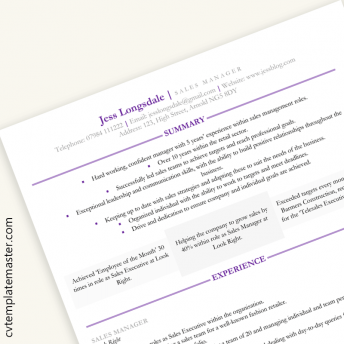
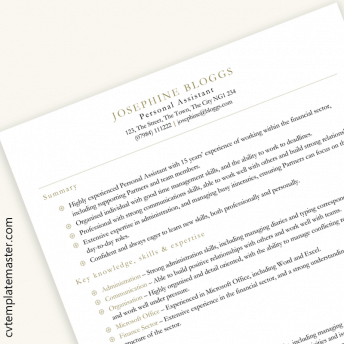
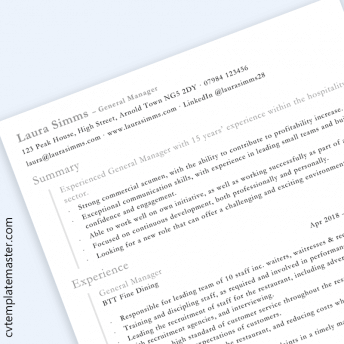
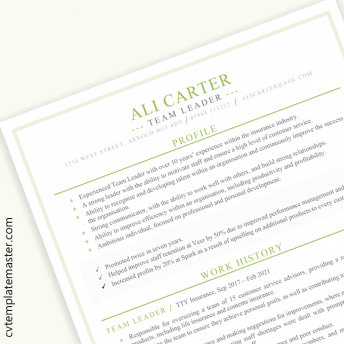
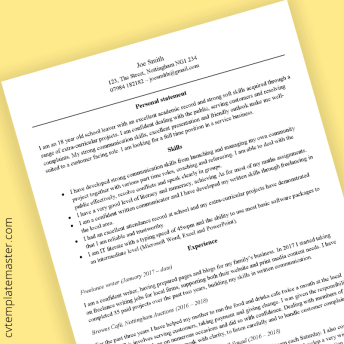
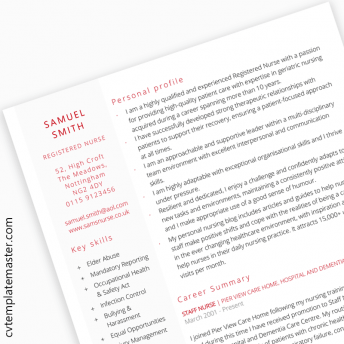
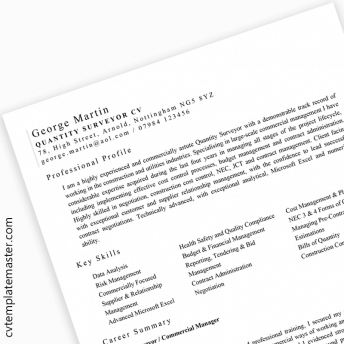
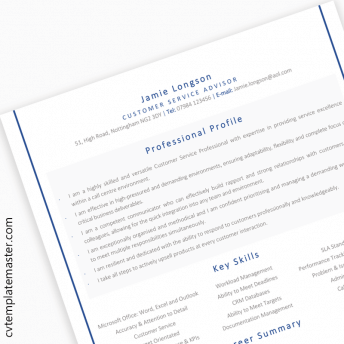
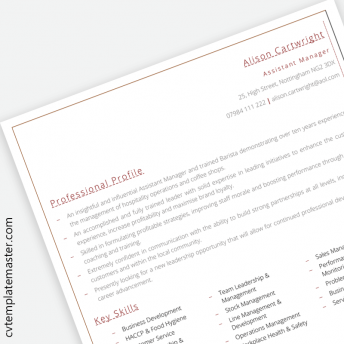
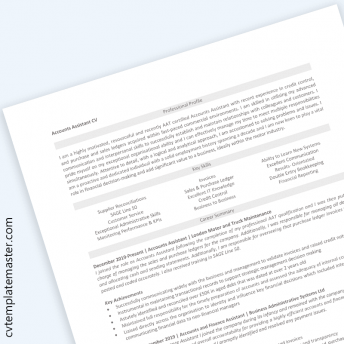
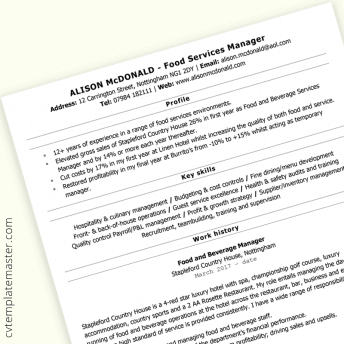
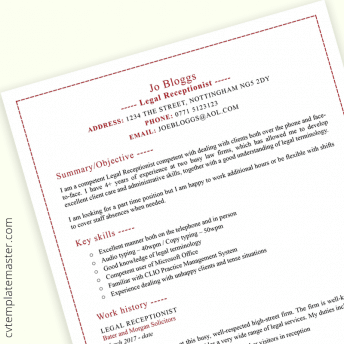
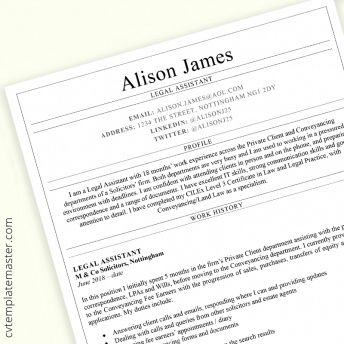
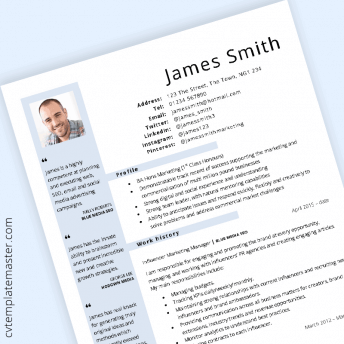
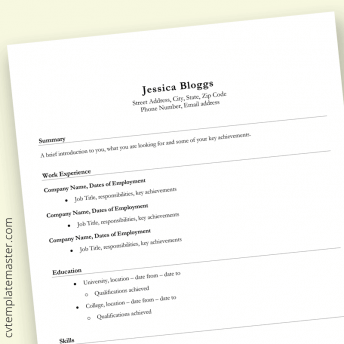
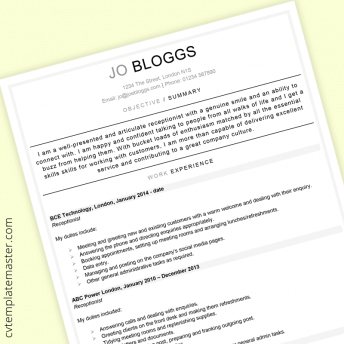
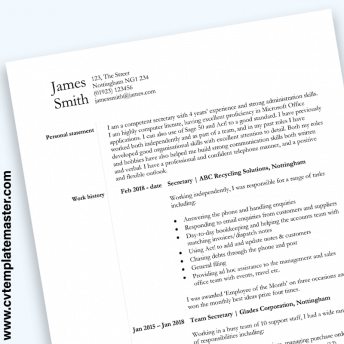
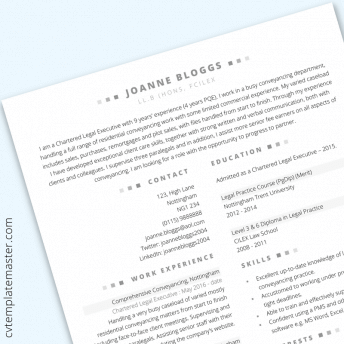
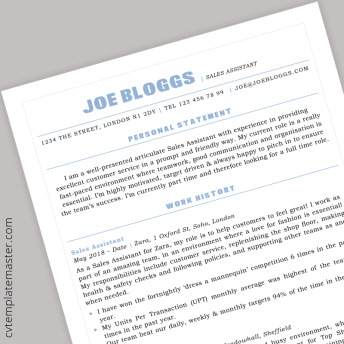
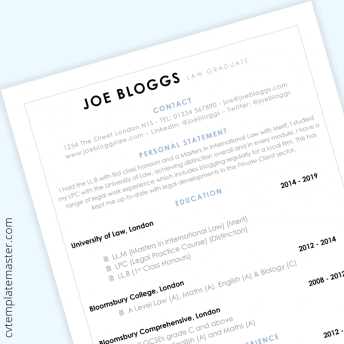
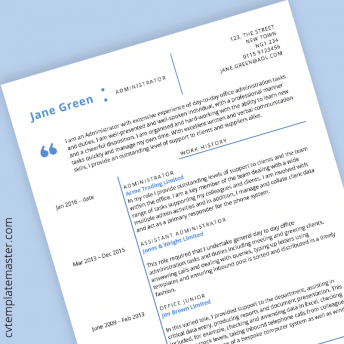
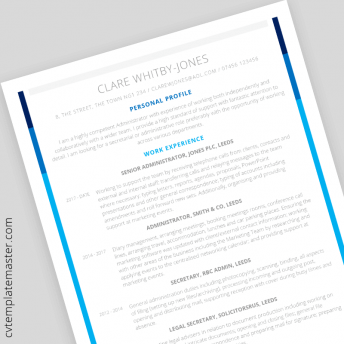
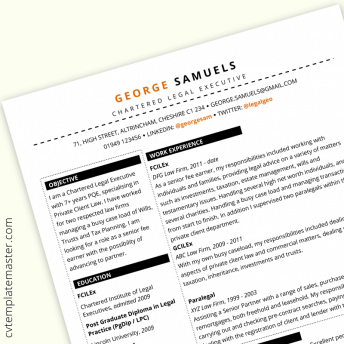
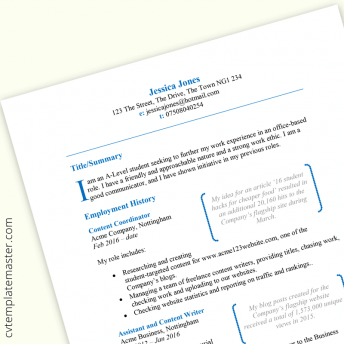
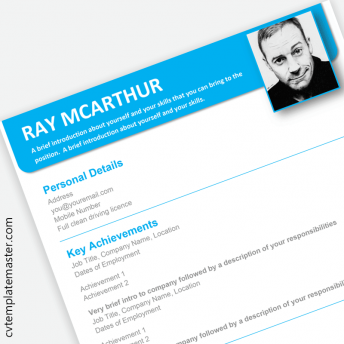
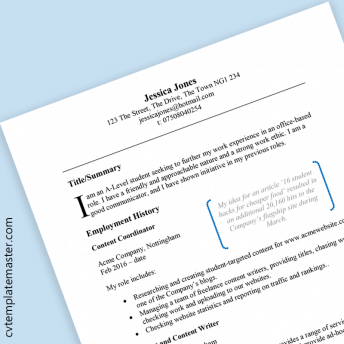
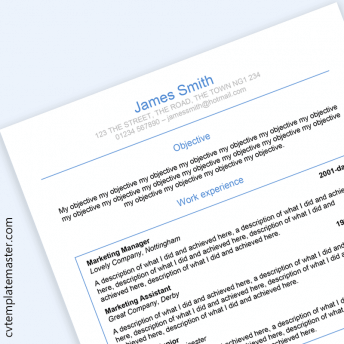
Leave a comment